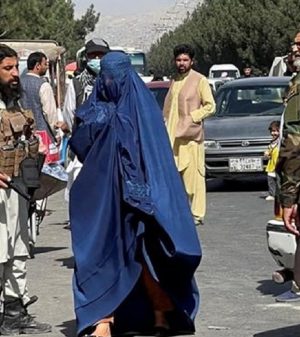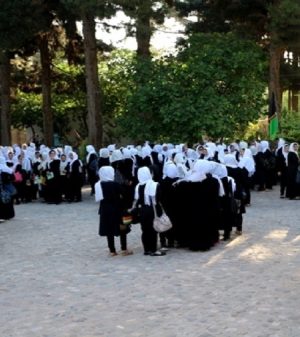 By: Aref Wafayee
By: Aref Wafayee
Translated By: Mohammad Sakhi Rezaie
The Taliban negotiations team in Doha Talks repeatedly told the international media during their interviews that they have changed; especially about women’s rights. However, after the fall of the elected government and the resurgence of Taliban, on 15 August, 2021, Afghans saw no positive changes in Taliban’s policies on women’s rights. Since then most of the Taliban’s edicts have been on restricting women in Afghanistan.
Taliban have issued several edicts on restricting women’s rights after they have retaken power. The following edicts are some of the major edicts issued by the Taliban.
Restricting Women’s political rights
The Taliban take care government was announced on September 7, 2021, chaired by Mullah Hassan Akhond. On one hand, there was no women in the Taliban’s cabinet and on the other hand Taliban dissolved Ministry of Women and Afghanistan Independent Human Rights Commission, the two institutions supported women in Afghanistan. They also established institutions to further limit women’s rights including the Ministry of Promoting Virtue and Preventing Evil.
Afghan women, being deprived of their political rights and experience increasingly their rights restricted and denied by the Taliban, took to the streets and staged peaceful demonstrations to demand their rights and voice their concerns to the Afghans and the world. Afghan women’s rights protestors have taken many initiatives in Kabul, Herat, Balkh and Nangarhar, demanding meaningful participation in government and other political processes in the country. However, when Afghan women protests were extended in other provinces, Taliban government banned women’s protests on 30 September 2021. This decision enabled Taliban to silent women to some extent paving the way for further excluding women from the public scene.
Banning women from working for public office
One month after taking Kabul the new Taliban government issued several decrees rolling back the rights of girls and women including banning Afghan women from working for public office, except health sector. Guardian reported on 18 September, 2021, that the edict has been in place and women and girls were not allowed to attend office.
According to reports of the Ministry of Economy of Afghanistan women constituted 16.6 of the work force of the country in 2020 for public and private sector. However, after the Taliban edicts, most of Afghan women have lost their jobs in public sector while most of them have been the bread winners for their families.
However, Taliban not only restricted women working in public offices, but the decided to fully exclude them; as a result, they issued Taliban banned women from working for foreign and domestic NGOs on. The Taliban government on 24 December 2021 ordered all foreign and domestic non-governmental groups in Afghanistan to suspend employing women, allegedly because some female employees didn’t wear the Islamic headscarf correctly. Following this, a number of the international NGOs stopped their activates in Afghanistan and said they cannot effectively reach children, women and men in desperate need in Afghanistan without the women in their workforces.
Limitations of the Rights to Freedom
Most of the Taliban’s edicts have targeted women’s freedom, especially women’s rights to choose dress, movement, freedom of opinion and entertainment.
The rights to choose dress: Taliban announced on August 23, 201, that Afghan women enjoy full women’s rights and only Islamic hejab has been added to them. But they announced on April 5, 202, that women shall wear burqa. Taliban had already announced that women shall wear the Islamic hejab correctly.
According to a research by the Human Rights institute of San José State University, imposing Taliban’s hejab is not consistent with the dress culture of some parts of Afghanistan and especially with dress culture of the Afghanistan Central Highlands or Hazarajat, which is considered as imposing culture values on other groups against their will. Social dress code of the central highlands never include black burqa and the women of these area have their own code of dress. However, Taliban have forced women and even girl students to wear borqa.
Freedom of speech: Taliban announced on 14 November 2021, the local media that they shall broadcast series women have a role in them. Afghan media already had changed their policies to align them with the Taliban and had stopped broadcasted foreign series and stopping recreational programs. In another edict, Taliban ordered local media women announcers shall wear hejab and cover their face with a mask.
Freedom of movement: Taliban announced on 5 November women cannot accompany women to a hospital. According to this edict, a female chaperon shall accompany women to the hospitals or visiting a doctors.
Zabihullah Mujahid announced on September 26, 2021, public urban transportation and taxis shall not give a ride to those women who do not observe hejab. They also announced passenger companies and drivers shall not allow women without a chaperon for long distance trips with more than 78 kilo meters. Taliban also announced on March 25, 2002, banned women from flying without a man and they said women were not allowed to travel out of Afghanistan. After these edicts, women travelling in Afghanistan faced many problems and travelling out of the country was stopped.
Banning women’s sports
Afghan women had significant sports and fine arts achievements during the former government. But after the collapse of the former government and resurgence of the Taliban, they suspended women’s sports on September 8, 2021. One of the members of the Taliban cultural Commission, Ahmadullah Wasiq, in a press conference with media told the media that women are not allowed to participate in sports events. Because their face and body maybe seen during the sports and it was against the Islamic values. After the announcement, all women sports team that participated in international sports events during the former government stopped working.
Deprivation of the right to recreation and bathing
Taliban banned women from public parks and recreational places on November 29, 2022. Before this edict, Taliban had segregated the parks and entertainment places. Taliban spokesperson for the ministry ordering to virtue and prohibiting from vice told French News Agency that as women had not followed the segregation order of the group, the have banned the parks and recreational places on them. Following this edict, Taliban issued another verdict banning women from the public women bathing throughout the country.
Limiting the right to education
The ministry of Education of Taliban announced on 17 September 2021, to attend schools. However, the announcement did not mention when girl students could attend schools. At the beginning, it was predicted the Taliban authorities may soon open the girls’ schools. But the ministry of Education of the Taliban only opened girls’ schools under grade 7 on girls.
The Taliban authorities announced on 5 October 2021 that the girls and boys classes shall be segregated, girls shall observe full Islamic hejab and they shall study specific fields of education. When the educational year 2022 started, the doors of girls’ schools were open to girls for a short period in some provinces. But soon Taliban issued a verdict to ban girls’ schools.
While girls’ schools remained closed, Taliban held national entrance exam on 13 October 2022, after one-year delay. According to the Ministry of Higher Education, about 150,000 students and about 115,000 students passed the exams successfully. However, female students faced restriction in the entrance exam too because they faced limitations in selecting specific fields of education. As a result, female students were not allowed to select journalism, agriculture, veterinary medicine, engineering and economy.
Although deepening restrictions on women and girls’ education posed mounting challenges on the way of women and girls’ education, they thought it maybe for a short period and Taliban leadership may change their restrictive policies. The Taliban Ministry of Education issued an edict on 13 October 2022, banning Afghan women and girls from higher education in public and private universities.
As a result, the Taliban take care government has destroyed all administrative and political structures to ensure gender equality and women’s rights in the country. Taliban has continued exclusion of women from the social life and deepening restrictions on women without paying least attention to the UN, Amnesty International, Human Rights Watch and Organization of Islamic Conference.










Add Comment